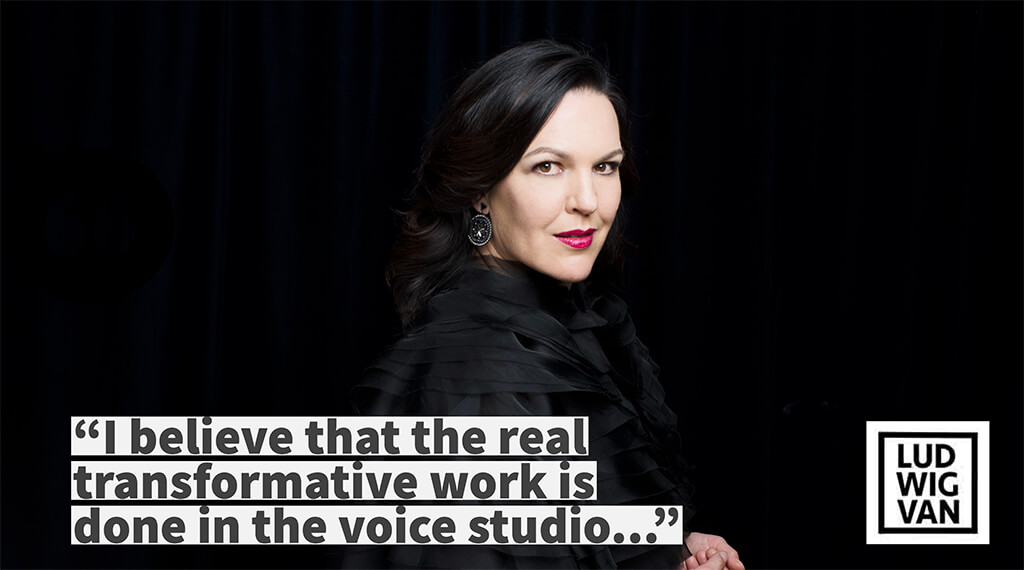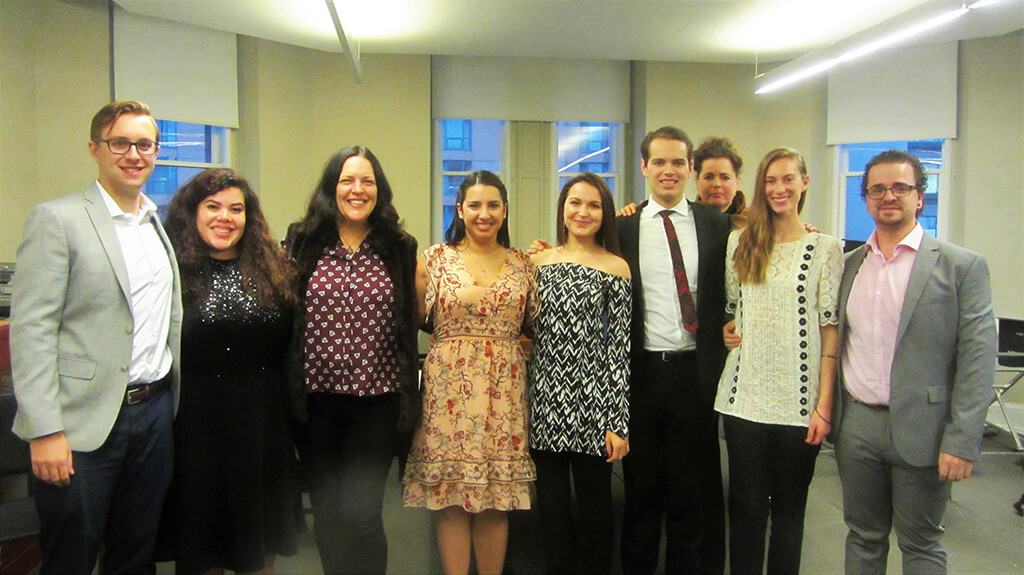
The new year is barely one week old, and the happiest of news in opera/voice education has just been announced — the preeminent Canadian soprano Adrianne Pieczonka has been appointed Vocal Chair and Head of the Voice Department of the Glenn Gould School (GGS), the professional arm of the Royal Conservatory of Music in Toronto.
As an opera lover and music journalist, I have been following Pieczonka’s career from the very beginning, when she made her professional debut as the Female Convict in the 1988 Canadian Opera Company production of Lady Macbeth of Mtsensk. I also remember vividly her first big role at the COC, as Mimi in La boheme in 1994. Having interviewed her and written a dozen articles on her over the years, I can say she’s a complete artist, excellent from Wagner and Strauss to Verdi and Puccini, always combining gleaming vocalism with a sympathetic stage presence.
Pieczonka has started giving masterclasses, passing on her knowledge and experience to the next generation of Canadian singers. Just this fall, I attended the “Encounter,” a day-long masterclass she gave to ten singers at the IRCPA (International Resource Centre for the Performing Artists). The singers, promising young professionals, all benefited from her tutelage. The concert that resulted was a testament to the effectiveness of Pieczonka as a teacher.

I saw Adrianne “in action” again a bit over a month ago, in a masterclass at the Glenn Gould School. For four hours, she put seven students through their paces, in opera and song repertoire. I liked all the voices — to be sure, some were more ready for prime time than others, but every one of them had fresh, youthful voices and showed great promise. Adrianne was once again the exemplary pedagogue, and the “kids” will now continue to benefit from her tutelage during their tenure at the GGS.
When I received the news, I quickly got in touch with Adrianne, who is currently Artist In Residence at Mount Allison University and busy preparing for an upcoming recital. We had a phone conversation during her break from rehearsals, when she shared her insights on singing and teaching:
What made you decide to go into teaching? Or have you always been interested in it?
I had such wonderful teachers in my life. In my high school years, I came in contact with some incredibly nurturing and talented teachers who really inspired and supported me along the way. I studied with Alvin Reimer at the University of Western ON. At U of T, I studied with Mary Morrison and with whom I studied for many years when I would return to Toronto. In London, I studied with Vera Rozsa who was Kiri Te Kanawa’s teacher before me. In Vienna, I studied with Hilde Zadek (who just turned 101 years old!!). When I moved back to London, I studied with Gita Denize. So I had these marvellous teachers to show me how important (and often fun!) teaching can be. One more thing struck me: teaching keeps you young! I do see how working with young singers can energize the teacher. It keeps you connected to life, to music, to youth and vitality.
When did you teach your first class?
I think I taught a class way back in 1994 for the Opera School. I was singing Mimi at the COC, at the O’Keefe Centre. I was just 31 years old then, and I’m not sure how much wisdom I imparted to the students. With every year I gain more information and experience.
Teaching a masterclass is very different from teaching a voice student on a weekly basis, to be there for her/him when they need you. Do you plan to do both types of teaching?
Yes, I would like to do both types of teaching ultimately. The position at the RCM currently does not involve one-on-one lessons, but this is something which could perhaps be added at a later date. Masterclasses are very interesting, but I do believe that the real transformative work is done in the voice studio, week in and week out.
Are you continuing your singing career? Or are you thinking of scaling back your engagements? Do you foresee at some point to become a full-time teacher?
I am still performing and plan to keep performing and teach at the same time. With every passing year, I take stock of how I am feeling vocally. I have been doing some pruning of my roles which I think is just par for the course. I know my body and my voice, and I listen to it. When it tells me that a certain role is no longer 100% comfortable, then I adjust accordingly. One change I am making in my career is that I don’t want to be on the road as much as I’ve been in past years. In the past, I would be gone for weeks if not months at a time. Our daughter is now a teenager, and I want to be home more in the next few years before she goes off to university. Last fall I did shorter trips to Europe, and this worked very well. I am also singing a few more concerts which involve shorter time periods. Doing a new opera production often involves a two-month commitment which is a very long time to be away. At some point, I do think I will be a full-time teacher, but I’m not there yet!
When you were a voice student, did your own teacher make a big impact on you? How did they inspire you? I know you studied with Mary Morrison. I think you also studied with Hilde Zadek and Vera Rozsa, if I remember correctly. Others? How have your teachers influenced you?
Teachers like Hilde Zadek and Mary Morrison were invaluable because we sang the same repertoire. Hilde could say — OK, on bar 52, watch out because the French horns come in very loudly and you will have to be aware of this etc. It was so helpful. Hilde sang much of my Strauss repertoire as well as many of my Verdi heroines.
What are the qualities that makes someone a good teacher? Kindness? Empathy? Full of encouragement? Or should a teacher believe in tough love? A no-nonsense task-master? How do you as a teacher bring out the best in a student?
I think its a balance….to be just kind and empathetic will not make the grade. “Tough love” is sometimes required too — when a student is not progressing as you feel they should be then some frank discussion is required. Being a voice teacher requires being a listener, sometimes a bit of a therapist as well because the voice is so connected with the psyche. If there are some emotional issues which the singers is dealing with, often these can affect his/her singing. It can be quite complicated but it’s very fascinating.
I am of the school that being cruel will get you nowhere. We’ve all heard stories of very cruel or sadistic teachers who will remain nameless. They seemed to enjoy humiliating young singers and attacking them in public. This is not a good strategy as a teacher. But being firm, insisting that the singer come prepared and is disciplined is a good first step.
What was the best advice you have received from your teachers? Advice that you abide by to this day?
“Slow and steady wins the race.” Failure i.e., not getting a role after an audition, is not the end of the world. It happens to every singer and we can grow from these experiences. “Singing piano is a singer’s gold.” Anyone can sing loud but not everyone can sing softly. Protect and nurture the falsetto function of the voice at all costs!
Can you say a few words about your upcoming appointment at the GGS?
I’ve given yearly masterclasses to the AD students at the GGS for several years now. It’s a wonderful institution with beautiful facilities. I am excited about increasing my involvement with the students and the Voice Faculty.
I wish you the very best in your new appointment and having seen you teach on several occasions, I know you are terrific, and the kids will really benefit from your knowledge and experience. Toi toi toi!
Thanks so much, Joseph!!!



